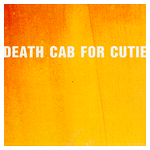 |
 |
|
|
|
| |||
 Death Cab for Cutie
Death Cab for CutieThe Photo Album [Barsuk; 2001] Rating: 7.1 I've always enjoyed looking at photo albums. Whether I know the people in them or not is pretty irrelevant. There's something about the medium of photography that just strikes me. Maybe it's just the possibility of stumbling across an accidental work of art-- that one shot where all the visual elements are balanced perfectly and someone exposes perhaps more of their personality than they intended. People can't really hide from a camera; it catches everything, be it a touch of nervousness in the smiles of a newlywed couple or the momentary pain of exertion on an athlete's face. It seems as though Ben Gibbard, on his latest outing with Death Cab for Cutie, the band's third album in just three years, has attempted to capture in his lyrics the verbal equivalent of amateur photography. That's not to say there's anything amateur about the poetry in his lyrics-- quite the contrary, in fact-- but he captures those same little secondary emotions of the moment that cameras capture so well. Add to this the fact that every song here contains at least one vividly rendered image in its lyrics, and The Photo Album, rotten pun aside, seems a fairly appropriate title. The album opens quietly with the brief, sleepy "Steadier Footing," a glimpse at a relationship that seems fated not to be. The organs, loosely strummed guitar and softly struck floor toms conjure a dead-on after-party atmosphere-- quiet, empty, a little smoky. From there, the band heads into "A Movie Script Ending," which feels the most like a logical extension of their work on last year's We Have the Facts and Are Voting Yes of any song here. The spacious drumming, intertwining guitar arpeggios and Gibbard's impassioned tenor pour forth a thick syrup of melody in the verses and chorus, before an unfortunately awkward bridge disrupts the flow of the song. Such moments haunt the remainder of the album, as well, though they're generally not too distracting. "We Laugh Indoors" suffers a bit from too-long instrumental passages centering on wandering, loosely connected guitar phrases, but drummer Michael Schorr keeps things moving with his insistent backbeat, and the band finds their way before long. Still, form-wise, the song is oddly constructed and fairly easy to tune out. "Information Travels Faster" kicks off with one of Gibbard's best opening lines. "I intentionally wrote it out to be an illegible mess/ You wanted me to write you letters, but I'd rather lose your address," he sings, as the band provides a steady backing for him and his atmospheric piano playing. The most gripping song musically, though, is also one of the most lyrically puzzling songs Gibbard has ever penned. I'm curious if Gibbard simply had an especially bad experience in Los Angeles or something, because "Why You'd Want to Live Here" is intensely bitter. Lines like, "I can't see why you'd want to live here," "It's a lovely summer's day and I can almost see a skyline through a thickening shroud of egos/ Is this the city of angels or demons," and, "You can't swim in a town this shallow," make me wonder if he even tried to find something he liked about the city before he wrote the song. But while the unrelentingly negative lyrics may be hard to digest, the music certainly isn't. It's like swallowing arsenic with candy-- the sweet melody and passionate delivery cause the song to jump out of the pack as one of the few actually capable of lodging in your brain. Similarly malicious is "Styrofoam Plates," though the vitriol expressed toward the narrator's departed father is a little more understandable when you consider the full story laid out in the song's lyrics. "It's no stretch to say you were not quite a father/ But a donor of seeds/ To a poor single mother/ Who would raise us alone/ We never saw the money/ That went down your throat through the hole in your belly," is a spiteful mouthful to be sure, and it seems quite plausible that Gibbard is writing autobiographically, though I won't purport to know his family history. One thing you may have noticed by now is that Gibbard has a tendency to sing in full, grammatically correct sentences. This marks him as a unique lyricist to be sure, but the downside is that it sometimes forces him to jam a bunch of syllables that don't flow very well into a melodic phrase. This makes for more than a few moments where you wonder if he wouldn't be better off resorting to a more succinct form. Thankfully, though, he has enough facility with his style that it doesn't hurt the music too much-- witness the pop excellence of "I Was a Kaleidoscope," a song that serves as a good reminder of why Death Cab were relentlessly compared to Built to Spill in the early stages of their career. Chris Walla's guitar hook shares the foreground nicely with Gibbard, who offers lines like, "My teeth chattered rhythms/ They were grouped in twos and threes/ Like a Morse code message from me to me." John Vanderslice and Sean Nelson offer backing vocals to fill out the sound. The Photo Album comes to a curious close as "Debate Exposes Doubt" collapses into quiet but dissonant piano and guitar figures, eventually petering out completely. Overall, it reads like a look through some stranger's photo album-- there are a lot incredible images contained within it, but there are also a few embarrassing shots and the occasional moment in time that isn't framed quite right. Still, the good outweighs the bad by a fair shot and it's more than enough to wonder what kind of images the band has yet to treat us to. -Joe Tangari, November 15th, 2001
|
|||

